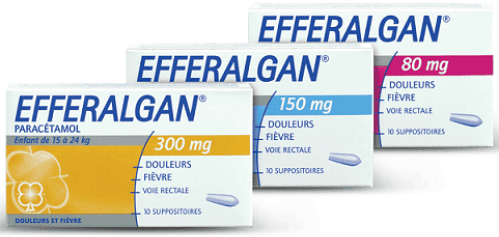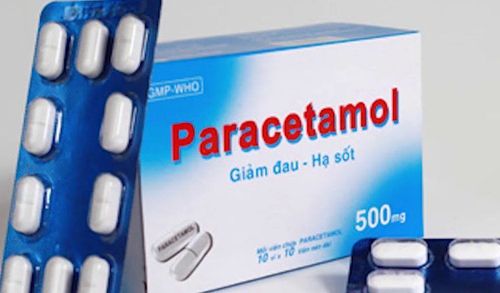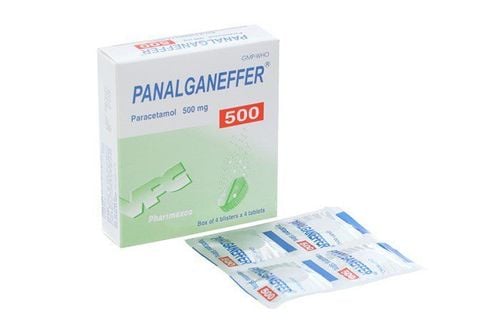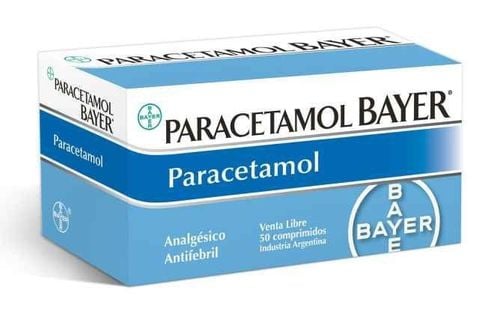This is an automatically translated article.
Decolgen ND is a combination drug, effective in reducing pain, reducing fever and reducing symptoms of runny nose, stuffy nose in cases of upper respiratory tract infections. In order to use the drug properly, you need to understand the composition and use of the drug.
1. What are the effects of Decolgen ND?
Decolgen ND drug has active ingredients including Paracetamol (acetaminophen) 500mg and Phenylephrine Hydrochloride 10mg. Prepared in the form of tablets, the drug has the effect of reducing headache, reducing body aches, reducing fever, reducing nasal congestion, runny nose. Those effects are due to the effects of active ingredients including:
Paracetamol (acetaminophen): This is a non-steroidal anti-inflammatory drug. It increases pain threshold and controls mild to moderate pain symptoms such as headache, muscle aches, joint pain, and discomfort that often accompanies a cold. The drug acts on the hypothalamus (the body's temperature-regulating center) causing hypothermia, increased heat loss to the environment by vasodilation and increased peripheral blood flow. Paracetamol lowers body temperature in febrile patients, but it rarely lowers body temperature in normal people. Although classified as an anti-inflammatory analgesic, this drug has almost no anti-inflammatory and antiplatelet effect as other drugs in the same class. Note that when overdose, it will produce a metabolite called N-acetyl-benzoquinoimin, causing severe toxicity to hepatocytes, causing acute liver failure, destroying liver cells if not treated promptly. Phenylephrine: The drug acts directly on the α-adrenergic receptors on the respiratory mucosa, causing vasoconstriction, constricting the swollen nasal mucosa, helping to reduce edema, tissue congestion, nasal congestion and increase ventilation through the nose, especially in areas of the nasal mucosa where topical drugs such as sprays, drops... cannot reach. When these two ingredients are combined, they both help relieve symptoms and do not cause drowsiness as a side effect.
2. Indications and contraindications of the drug Decolgen ND
The drug is indicated for use in the following cases:
Treatment to help relieve symptoms of common cold, allergic rhinitis, vasomotor rhinitis, secretory mucositis caused by colds, rhinitis and sinusitis and other disorders of the upper respiratory tract. Reduce pain, reduce fever in cases of upper respiratory tract infection. Contraindications:
Hypersensitivity to the active ingredient of the drug or to any other ingredient of the drug; Severe liver or kidney failure; Patients with glucose-6-phosphate dehydrogenasse (G6PD) deficiency; As for the active ingredient phenylephrine: Do not use the drug when suffering from thyroid disease, diabetes, hypertension and other cardiovascular diseases, in case of difficulty urinating due to prostate enlargement;
3. How to use and dose of Decolgen ND
How to use: The drug is taken orally. Can be taken before or after meals. But to reduce stomach irritation, it should be taken after meals.
Dosage:
For adults take 1 to 2 tablets each time, 3 to 4 times a day. Children from 7 to 12 years old: 1⁄2 to 1 tablet each time, 3 to 4 times a day. Children from 2 to 6 years old: Use 1v / time, 3 to 4 times a day. For children under 2 years of age: Not recommended for children under 2 years of age.
4. Undesirable effects when using the drug Decolgen ND
Both of these ingredients can cause side effects when taken, some of the possible side effects include:
For paracetamol: Rarely cause side effects, but it can cause some symptoms manifested as skin rash, hematopoietic disorders, anemia, kidney disease. Rarely cause hypersensitivity reactions. For Phenylephrine: May cause nervous agitation, restlessness, anxiety, trouble sleeping, fatigue, dizziness, chest pain, tremor, paresthesia of extremities, increased blood pressure, paleness, cold feeling ...Uncommon, hypertension with pulmonary edema, arrhythmia, peripheral vasoconstriction, respiratory failure, hallucinations, desquamation, blurred vision... Rarely, it may cause focal myocarditis, bleeding pericardial blood.
5. Notes when using Decolgen ND
To use the drug safely, you need to keep a few things in mind:
When taking the drug, it is necessary to tell your doctor or pharmacist about the history of allergies, comorbidities to avoid unwanted effects; Paracetamol overdose can occur when overusing the drug, using many drugs with the same ingredient at the same time, used in high concentrations at one time and can cause symptoms such as nausea, vomiting, abdominal pain. Symptoms appear 2 to 3 hours after taking the drug. More severe, can cause Methemoglobinemia (manifested as cyanosis of the skin and mucous membranes), confusion, confusion, coma, impaired liver function if not promptly treated. When an overdose occurs, it is necessary to immediately notify medical staff for timely intervention, if possible, N-acetylcysteine can be used as an antidote. If the late treatment is determined to be 36 hours after taking the drug overdose, often the damaged liver will be difficult to recover; Overdosage of the phenylephrine component causes increased blood pressure, headache, convulsions, cerebral hemorrhage, palpitations, extrasystoles, restlessness. These symptoms need to be treated in medical facilities. The drug should be used with caution in the following cases: Chronic anemia; people with liver and kidney diseases; Alcoholism because Paracetamol and alcohol are both harmful to the liver. Avoid the combination of this drug with other preparations also containing Paracetamol can cause overdose. Pregnancy: When using phenylephrine in late pregnancy or labor can cause hypoxia to tissues and slow fetal heart rate due to increased uterine contractions and decreased uterine perfusion. Phenylephrine has not been detected in breast milk, however, caution should be exercised when administered to a nursing woman. Patients should stop taking drugs containing phenylephrine if symptoms persist for more than 7 days; or have other accompanying symptoms such as high fever, restlessness, dizziness, insomnia. Patients should also not take medications containing phenylephrine while being treated with or just off treatment (for 2 weeks) with an MAO inhibitor. When side effects appear, you should notify your medical staff for the best advice. Store the medicine in a dry place, away from sunlight. Here are some side effects and precautions when taking the drug. This medicine treats the symptoms of the disease, but does not treat the cause. Therefore, if diseases such as infections need to be treated with additional drugs to treat the cause.
Follow Vinmec International General Hospital website to get more health, nutrition and beauty information to protect the health of yourself and your loved ones in your family.
Please dial HOTLINE for more information or register for an appointment HERE. Download MyVinmec app to make appointments faster and to manage your bookings easily.













